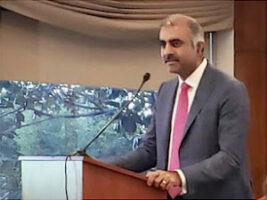Key learnings from CEO Thought Leadership event organized by NASSCOM Haryana on January 16, 2015
Indian IT/BPM industry is at a very interesting juncture. It has established itself as the dominant offshore location with an unmatched proposition of scale, maturity, talent and expertise. At the same time, the technology landscape is evolving at a ferocious pace that is challenging the fundamentals of the industry. Social, Mobile, Analytics and Cloud are no more emerging technologies. They are changing customer and business behaviors and expectations in very significant ways.
It is imperative that Indian industry evolves and raises its game to take advantage of the tectonic shifts happening in the industry. In the new landscape, intellectual property, creativity and accelerated time to market are going to be critical. This requires large, established companies to focus on innovation not as a ‘nice to have’ but as the foremost priority. Equally there is a need to encourage and fast forward the development of product start-ups. It is the latter where we are likely to see the most significant breakthroughs in ideas and applications for the new economy.
Collaboration between large companies and product start-ups could be a great strategy for the Indian industry to win in the new technology landscape. It could provide large companies access to ideas and talent that it might not be easy for them to develop in-house. Equally it can provide product start-ups access to customers and a learning opportunity that can hugely accelerate their development.
NASSCOM Haryana has been focused on this theme of collaboration to accelerate innovation and organized a CEO Thought Leadership session on January 16 to discuss and develop ideas on this. We had an outstanding panel of industry leaders for this discussion: Amitabh Srivastava (CIO Sony India) and Manish Choudhary (MD, Pitney Bowes India) representing large companies, and Mohit Bhishikar (CIO, Persistent Systems) and Sumeet Kapur (Founder, Global Groupware Solutions) representing two product companies with very different focus and at different stages of evolution. The discussion was moderated by Nitin Seth (MD, Fidelity Worldwide Investments – India). In addition, Aparna Gupta (MD FirstRain) introduced NASSCOM Haryana’s efforts around Innovation & Entrepreneurship and in particular the two very successful “Pub Crawls” help last year, which connected entrepreneurs with senior industry leaders. We also had two young start-ups Credext and Ipsator who gave a short pitch on their businesses.
In this note, we want to share with you key insights from the panel discussion on the following topics:
- Current state of play on collaboration between large companies and product start-ups
- What can product start-ups and large companies do to raise their game
- Ideas for strengthening Gurgaon/NCR ecosystem for innovation and collaboration
Current state of play
Panel recognized that collaboration between large companies and product start-ups is in its early stages with few stellar success stories. However, there were many interesting examples shared by the panel that demonstrate viable models for collaboration and show direction for the future:
- Large companies working with Product Start-ups. Amitabh shared how Sony has been working with a number of Indian product companies. Sony India has benefited from the domain knowledge and flexibility that these companies bring. At the same time there are issues with managing scale, security and stability that Amitabh felt the India product start-ups need to improve on
- Corporate Accelerators/Incubators. Manish shared how Pitney Bowes has established a Corporate Accelerator within their India Operations as a source of identifying and nurturing technology innovations for their global organization. They are currently incubating 8 start-ups in their accelerator. While the initial hunt for getting the right start-ups was difficult, the ones they are incubating are progressing very well.
- Indian product companies scaling up. Mohit shared the Persistent story, which is a great story of an Indian product company scaling up. Persistent has been there for over 24 years, has ~8000 employees and works with several large technology companies across US, Europe and India. According to Mohit, Persistent’s success is based on their DNA of software product development and innovation, which they keep doing every day.
- Indian product companies for the Indian market. Sumeet made a strong case for product companies focusing on the Indian market and that you can build a viable business doing that. Sumeet’s point was that it is not easy to get access to the US market and the funding required for doing it is huge. On the other hand, it is easier to understand and solve specific problems for the Indian market and get access to the customers.
Raising the game
Both the panel and the audience came up with a number of suggestions on how the Product Start-ups and Large companies could raise the game on collaboration – how product start-ups could sell more effectively and be more effective long-term partners; and, how large companies could better leverage the innovation opportunity that product start-up provide.
Ideas for Product Start-ups
- Sharp value proposition. Focus on identifying and solving specific business problems. The age of “me too” products is gone. One of the panelists put it nicely that, “Can’t blame the Enterprise CIOs for not buying ‘me too’ products”.
- Choose your customer. Start-ups should not spread themselves too thin trying to sell to everybody. Every enterprise that has the need is not a customer. First customer is likely to be an innovator. Need to identify CIOs/Enterprises where your product fits their agenda and who will be willing to push the boundaries. A successful product entrepreneur made the point that “if the CIOs takes too much time, I drop them!!”
- Focus on CMO. Increasingly CIOs are losing leverage to CMOs in product buying decisions. Often CIO is not a user, but at best a gatekeeper. This is important to recognize because the CIOs and CMOs will likely look at different things
- Stability and Scalability of solutions. Many CIOs appreciated the domain knowledge and cost advantage that product start-ups provide. However, their key concern was that Indian products do not meet the test of production stability and scalability. This is a concern that Indian product start-ups have to address upfront
- Passion. Most CIOs mentioned that passion of the product start-up was a key factor for them to make a buy decision. Important for start-ups to keep this in mind!!
Ideas for large companies
- India based CXOs/CIOs need to be persistent evangelists. CXOs/CIOs need to raise the awareness of the benefit of buying from Indian product start-ups within their global organizations. In the global organization, there are already embedded relationships with international product companies. In addition, there is often a poor perception about Indian products. Therefore, CXOs/CIOs need to be persistent in raising awareness and managing the bureaucracy of decision making processes. There is a significant value advantage that Indian products can provide, which needs to be highlighted. In addition, defining global and local decision rights can provide India based CIOs flexibility to make local decisions more efficiently
- Explore creative collaboration models. It is interesting to see that a number of multinational companies are setting up corporate incubators and VC funds in India to get access to technology start-ups. This is a great model to leverage the local ecosystem to drive disruptive innovation not just within the Indian organization but globally. More CXOs/CIOs should explore such creative collaboration models for their global organizations
- Due diligence. While working with Indian product start-ups, Enterprise CIOs might need to think about due diligence differently. Often there is an over focus on financials. Product start-ups are unlikely to make the cut on that. Instead need to focus on the domain expertise and execution capability of the start-up especially the founders
- Exit strategy. It is likely that some of the product start-ups you work with will struggle. CIOs need to recognize that that they will need to be supported. At the same time, CIOs need to have their exit strategy for product start-ups that fail on them.
Strengthening the Gurgaon/NCR ecosystem
There was recognition that Gurgaon/NCR is lagging Bangalore in terms of start-up activity. There were number of suggestions that came for strengthening Gurgaon/NCR as a start-up ecosystem.
- Focus on demand side. There is extensive presence of the buyer community in NCR. Therefore, the model for Gurgaon/NCR is perhaps not Silicon Valley but New York, where the start-up ecosystem is driven by meeting the needs of the Enterprises
- Catch them young. Focus on grooming budding entrepreneurs right at the graduate level. NASSCOM should reach out to colleges and have successful entrepreneurs lead sessions for students inspiring them to be entrepreneurs and coaching them on the start-up basics
- Build domain knowledge. Need to go beyond technical expertise and develop mechanisms for deepening business understanding and domain knowledge
- Networking of CIOs. Bring CIOs together so intermediation of demand and supply can happen efficiently. Mohit shared how in Pune they have set up CIO club that keeps connected amongst other ways via sharing of ideas in a WhatsApp group!!
The panel discussion reinforced the potential for accelerating innovation through collaboration between product start-ups and large companies. This opportunity can be a game changer for both and there is need for them to step up their game to realize the potential. Many ideas have been shared in this note on how they can raise their game. However, we are in early stages of the journey and more discussion is needed.
NASSCOM Haryana is very committed to developing Gurgaon as a hub for innovation and entrepreneurship. We would highly appreciate your ideas and involvement in this endeavor. Please feel free to reach out and share your thoughts.
Thank you



